
The Deportation Data Project, co-directed by Berkeley Law Professor David Hausman, recently released a report analyzing immigration enforcement in the first nine months of the Trump administration.
The project, which tracks the government’s own records, continues to help journalists and policymakers understand what U.S. Immigration and Customs Enforcement (ICE) is doing.
The analysis shows that deportations from within the United States increased by a factor of 4.6 in the first nine months of the administration’s crackdown. During that period, ICE arrests quadrupled, and street arrests spiked by a factor of over 11 — with a sevenfold increase in arrests of people without criminal convictions.
The administration roughly tripled the number of detention beds for people arrested inside the U.S., an increase that’s partially the result of a massive infusion of funding for ICE and a drop in arrests at the border. Once arrested, the analysis finds, few were let out: Releases within 60 days of arrest, at 16% in the last six months of the Biden administration, plunged to 3% under Trump.
Voluntary departures by immigrants, typically rare compared to removals, increased by 21 times.
The analysis was widely covered by the news media, bringing hard numbers to a story that can get bogged down in anecdotes and funding debates.
“It’s been great to be able to test the government’s claims against its own data — and what we’ve found is that, as ICE has arrested more people, those arrests have become more and more random,” Hausman says.

A team of scholars including Professor Jonah B. Gelbach is one of two recipients of the 2026 Civil Justice Scholarship Award from the National Civil Justice Institute for an article published in the University of Chicago Law Review last year.
“Shedding Light on Secret Settlements: An Empirical Study of California’s STAND Act” is an empirical and qualitative study analyzing how California’s ban on secrecy in sexual-misconduct settlements has functioned in practice, testing longstanding assumptions about the effects of restricting non-disclosure agreements. Gelbach’s co-authors are Stanford Law School Professors David Freeman Engstrom and Nora Freeman Engstrom, then-Stanford student Garrett Wen, and University of Chicago Bigelow Fellow Austin Peters.
To explore litigation patterns before and after the state’s 2018 Stand Together Against Non-Disclosure (STAND) Act took effect, the team analyzed more than a quarter-million case filings from the Los Angeles County Superior Court and conducted in-depth interviews with two dozen practitioners.
Their findings — that restricting secret settlements caused little movement in the number of case filings and didn’t appear to have a significant impact on the complexity or length of litigation — suggests that settlements happen even without the cloak of secrecy.
The Civil Justice Scholarship Award recognizes current, scholarly legal research and writing focused on topics in civil justice, including access to justice and the benefits of the U.S. civil justice system, as well as the right to trial by jury in civil cases. Northwestern University School of Law Professor Myriam Gilles is the award’s other recipient this year.

Dave Jones, director of the Climate Risk Initiative at the Center for Law, Energy & the Environment, recently published an article in the Yale Law Journal analyzing how climate change is driving the growing property-insurance crisis and suggesting federal and state policy solutions.
“The Uninsurable Future: The Climate Threat to Property Insurance, and How to Stop It” compares the response of two states — Florida and California — and finds that neither approach will keep insurance available and affordable in the long run. Insurance is the canary in the climate crisis coal mine, Jones argues, and the bird is dying.
Florida has substantially deregulated insurance , while California has made regulatory changes that will result in even larger rate increases. Both moves, Jones writes, will be “overwhelmed by the rise in risk and increased losses driven by climate change” because they fail to address the underlying causes of the losses: emissions from the fossil-fuel industry and other greenhouse gas emitting sectors and increased development in high-risk areas.
There’s no insurance regulatory magic wand to fix the insurance system short of reducing emissions, Jones argues. But state and federal legislators can take actions to help keep insurance available in the short run, including requiring insurers to transition from investing in and underwriting fossil fuels, and requiring insurers to take property, community, and landscape level risk reduction measures into account when pricing and deciding whether to write or renew insurance.
“To preserve an insurable future, we need to transition from burning fossil fuels and from other greenhouse gas-emitting sectors” he writes. “Otherwise, the insurance ‘canary in the coal mine’ will sing no more.”
Jones is an international leader and expert on climate risk and financial regulation. He served two terms as California’s Insurance Commissioner from 2011 to 2018, leading the Department of Insurance and regulating the largest insurance market in the United States. Since joining CLEE he’s been a sought-after expert on the challenges facing the insurance industry and insurance regulators, in California, nationally, and internationally, as they deal with the impact of climate change.

Berkeley Law Professor Catherine Fisk ’86 recently received the Miller Award at the 2025 Colloquium on Scholarship in Employment and Labor Law, held at Seton Hall School. Named for the late Paul Miller — a renowned leader in the disability rights movement and an expert on international disability rights and anti-discrimination law — the award is given to an academic who has shown “outstanding academic and public contributions to the field of labor and employment scholarship.”
Fisk, who teaches California Employment Law, Civil Procedure, Labor Law, and Legal Profession, is also a co-founder and co-faculty director of the school’s Center for Law and Work, a hub for cross-disciplinary scholarship, student engagement, and community involvement to address pressing and emerging labor and employment issues.
She’s published more than 100 articles and essays and authored several books, including California Employment Law, Working Knowledge: Employee Innovation and the Rise of Corporate Intellectual Property, 1800-1930, and Writing for Hire: Unions, Hollywood, and Madison Avenue. Fisk is at work on two forthcoming books, Speech @ Work and No Neutrals: Lawyers for the 20th Century Labor Movement.

Matthew Hamilton, a Ph.D. student in the Jurisprudence & Social Policy Program, has recently published several essays and white papers for the Edley Center on Law & Democracy and the Carnegie Endowment for International Peace.
Each of his Carnegie essays examine facets of the 1944 Bretton Woods agreement in the context of today’s rapid geoeconomic and geopolitical changes. He advocates reforms that draw on the lessons of Bretton Woods to help construct a new international order, rather than an approach that seeks to realign the governance of the global economy with emerging geopolitical trends.
“Admittedly, the world that awaits at the end of this pathway to a reformed international economic order is still far from clear. But each week provides new reminders of the urgent need for the world’s main economic powers to chart this course,” he writes in “Reform or Realignment? The Geopolitical Lessons of Bretton Woods.” “The successes of the postwar multilateral system were imperfect, but they contributed to an enduring peace. The alternative course of realignment risks taking us in a more dangerous direction, reminiscent of the fateful spiral of the interwar years.”
The second essay, “What Is Bretton Woods? The Contested Pasts and Potential Futures of International Economic Order,” dives into the different interpretations of the system that emerged from World War II and explains how those perspectives could inform new plans for structuring international economic relations.
Hamilton is also pursuing a J.D. at New York University School of Law. His research focuses on the dynamic between law, globalization, and international order, including the role of private law in the construction of global markets and the history of economic and political thought. During the 2024-25 academic year, he was an inaugural doctoral fellow at the law school’s Berkeley Center for Private Law Theory.
His projects for the Edley Center are part of its series of white papers that serve as accessible explainers about the principles of law and democracy. “Continuity, Change And Contestation: Executive Power at the Start of the Second Trump Administration” examines executive authority as exercised during the first months of the Trump administration, situating new assertions of presidential power in their historical legal context and identifying their implications for American democracy.
His newest white paper, “The President’s Economy? The Law of Tariffs and Democracy,” considers the Supreme Court’s review of the Trump Administration’s IEEPA-based tariffs, and situates this dispute over IEEPA in relation to other tariff authorities that Congress has delegated to the President. Building on his other recent work, Hamilton considers how these authorities pose difficulties for building a reformed international economic order that can facilitate effective democratic governance.

Expert testimony plays a crucial role in modern litigation, but the complexity of legal disputes, particularly in commercial litigation, demands that judges engage deeply with technical methodologies — an expectation that strains judicial capacity and resources. In a new article in the Berkeley Business Law Journal, Professor Andrew C. Baker suggests reforms aligning evidentiary standards and judicial goals to create more transparent, consistent, and equitable outcomes, improve the judiciary’s gatekeeping role, and foster greater trust in the legal process.
Building on Baker’s previous co-authored works on securities litigation and valuation, “Statistical Learning Can Help the Judiciary Fulfill Its Gatekeeping Role Over Expert Witnesses” makes the case for using statistical learning techniques in expert testimony. Expert testimony is increasingly pivotal in commercial litigation — and often relies on techniques that are well beyond the grasp of a typical judge or jury.
“Fields such as antitrust, securities litigation, and employment discrimination increasingly rely on expert analyses to bridge the gap between legal principles and technical realities,” Baker writes. “However, this reliance has amplified concerns about the reliability of expert evidence.”
The standard for admitting expert evidence, established by the 1993 Daubert v. Merrell Dow Pharmaceuticals, Inc. case, requires rigorous scrutiny but also places a significant burden on judges. Baker proposes integrating statistical learning and algorithmic modeling to create a more objective and reliable blueprint for expert analysis.
“This approach not only enhances the credibility of expert testimony but also provides judges with a more transparent and administrable tool for evaluating complex evidence,” he writes.

The Center for the Study of Law and Society has unveiled its fall speaker series lineup, offering a weekly dose of pathbreaking interdisciplinary socio-legal scholarship. The lectures, on Mondays from 12:45-2 p.m. from Aug. 25 to Nov. 17, are available in person and on Zoom, with a 12:15 p.m. reception in the Kadish Library to start.
The speakers include UC Berkeley history Professor Stephanie Jones-Rogers discussing British laws of slave descent on the 18th Century Gold Coast; Washington University sociology Professor Liz Chiarello presenting about treatment and surveillance on the front lines of the opioid crisis; and USC Law Professor Bernadette Atuahene analyizing how racist policies undermine black homeownership in America.
Interested in keeping up with CSLS events? Join the center’s mailing list.

UC Berkeley Law’s Edley Center on Law & Democracy has just released two white papers, the first in a series of accessible explainers about the principles of law and democracy.
The first, “Continuity, Change And Contestation: Executive Power at the Start of the Second Trump Administration,” examines executive authority as asserted during the first months of the Trump administration, situating the assertions in historical legal context and identifying their implications for American democracy. Author Matthew Hamilton is a Ph.D. student in the school’s Jurisprudence and Social Policy Program.
The second, “Commander-In-Thief: President Trump’s Withholding of Federal Funds from Universities Based on Alleged Discrimination Unlawfully Disregards the Procedures and Limits Adopted by Congress in the Civil Rights Statutes,” asserts the administration has “repeatedly exercised an authority it does not have” in its moves to withhold federal funds from educational institutions without any formal process. Written by center Executive Director Catherine E. Lhamon and Senior Fellow Seth M. Galanter, the paper argues the administration’s actions are inconsistent with the statutory requirements in Title VI of the Civil Rights Act of 1964 and in Title IX of the Education Amendments of 1972 and explains the genesis of federal authority to withhold funding based on alleged discriminatory practices, the statutory framework to withhold these funds, and the constitutional framework that deprives the president of the legal authority needed to act outside that process.
The center was established in fall 2024 to honor Edley, UC Berkeley Law’s dean from 2004 to 2013 and a lifetime public servant and a fierce advocate for strengthening governmental effectiveness and democratic institutions. Lhamon, a renowned public service lawyer who’s served in a variety of roles from California to Washington, D.C., joined the center earlier this year.
To get alerts about new white papers in the series, click here to subscribe to the center’s newsletter.

Berkeley Center for Consumer Law & Economic Justice Senior Fellow Samuel Levine testified before the U.S. Senate Judiciary Subcommittee on Privacy, Technology, and the Law about the harms that emerging technologies pose to consumers’ privacy and personal information. The hearing, “Protecting the Virtual You: Safeguarding American’s Online Data,” touched on tech privacy threats that Americans face absent any commonsense regulatory guardrails — from the use of sensitive personal data by healthcare providers and targeted advertisers, to the proliferation of online scams, to the increasing adoption of AI in everyday life.
In his testimony, Levine — former director of the Federal Trade Commission’s Bureau of Consumer Protection — described the threat of practices like surveillance pricing and unchecked data harvesting to economic fairness, democratic freedoms, and the health and safety of kids and teens.
Rising UC Berkeley Law 3L Abby Smith, former co-leader of the student-led Consumer Advocacy and Protection Society and Consumer Protection Public Policy Order, helped Levine prepare his testimony.

California Constitution Center Executive Director David A. Carrillo ’95 and Senior Research Fellow Brandon V. Stracener wrote amicus curiae briefs supporting Gov. Gavin Newsom’s lawsuit against the Trump administration seeking a restraining order to return control of the state’s National Guard to the governor.
Trump bypassed Newsom and mobilized the California National Guard in response to protests in parts of Los Angeles over raids by U.S. Immigration and Customs Enforcement agents. Newsom immediately filed suit in federal court, asking to curb the troops’ actions and questioning whether Trump has the power to direct National Guard troops and U.S. Marines without the state’s consent.
U.S. District Judge Charles R. Breyer ’66, who is presiding over the case, granted the state’s request for a temporary restraining order. The Trump administration then asked the U.S. Court of Appeals for the Ninth Circuit to stay Breyer’s order, which a three-judge panel stayed until it can issue its own ruling. Carrillo and Stracener filed a second amicus brief with the appeals court.
 Carrillo and Stracener’s brief to the district court is simple and direct: “State militias can only be federalized under express statutory conditions,” they write. “Those conditions are unmet here, so California’s militia was unlawfully federalized.”
Carrillo and Stracener’s brief to the district court is simple and direct: “State militias can only be federalized under express statutory conditions,” they write. “Those conditions are unmet here, so California’s militia was unlawfully federalized.”
Even if the statutory conditions were met, they argue, the authorizing statutes are unconstitutional because they violate the Tenth Amendment’s anti-commandeering principle, which forbids seizing state assets to enforce a federal policy. And even if federal statutory law can be so used, using a state militia for domestic law enforcement violates the Posse Comitatus Act.
“This Court should hold that the president’s order federalizing California’s militia is unlawful,” Carrillo and Stracener write.

In a new article in the Harvard Law Review, Professor Osagie K. Obasogie scrutinizes how the concept of “excited delirium” — characterized as a psychiatric response that produces such severe agitation that a person could spontaneously die — has become a problematic diagnosis that’s often used to absolve law enforcement officers from responsibility when suspects die in their custody.
Opening with three powerful stories of deaths in custody and bolstered by the first empirical assessment of how the concept has been treated as an evidentiary matter in federal courts, Obasogie notes that no established standards exist for excited delirium.
“By treating its gatekeeping function in relation to expert witness testimony as a procedural inquiry — that is, as a process or series of boxes to check — instead of embarking on a deep assessment of the evidence and its broader implications, law has come to give excited delirium much more credibility than science or medicine ever has,” he writes.
From the long-term perspective of the history of forensic science and the testimony of expert witnesses, he argues that the diagnosis is closer to often-discredited evidence such as bite marks than to more robust and better proven methods, such as DNA typing, Obasogie adds.
His policy prescriptions include following the lead of California, which has banned the use of excited delirium as a diagnosis and as a listed cause of death. But that law does little to address the idea that a sudden psychiatric condition could cause sudden death, and in other states, law enforcement and medical officials have simply used a different term to describe the same alleged phenomenon.
The problem, Obasogie writes, is not with the term, but “how medical language might deflect attention away from uses of force that predictably lead to death and limit police accountability.” Ultimately, judges need more training on how deaths in custody happen to adequately assess the testimony of expert witnesses that the Federal Rules of Evidence require.
“The findings show that excited delirium often enters evidentiary proceedings as a contested medical concept. Yet, through the machinations of the law of evidence, these claims exit courtroom proceedings as legally relevant facts,” Obasogie writes. “How this transmutation happens, and the evidentiary moves that make it possible, highlight the extent to which legal doctrine can settle an otherwise unsettled — if not wholly discredited — area of medicine to make deaths in police custody seem natural, blameless, and unproblematic.

A 2007 UCLA Law Review article by Professor Catherine Albiston J.D. ’93 Ph.D. ’01 was cited in a recent U.S. Supreme Court opinion.
In a 7-2 decision in Lackey v. Stinnie, the Court held that plaintiffs who won preliminary injunctive relief in a civil rights enforcement action under Section 1983 that later became moot cannot obtain attorney fees as prevailing parties. The Court ruled that plaintiffs can recover fees only if “a court grants enduring judicial relief that materially alters the legal relationship between the parties,” even if the defendant acted unilaterally to moot the case before plaintiffs could obtain a final judgment.
In a dissent joined by Justice Sonia Sotomayor, Justice Ketanji Brown Jackson cites Albiston’s article with Laura Beth Nielsen, “The Procedural Attack on Civil Rights: The Empirical Reality of Buckhannon for the Private Attorney General,” to refute the majority’s take that the ruling will have little to no impact. The ruling overturned unanimous precedent allowing fee recovery for preliminary injunctions in mooted cases from every circuit in the country, including the 4th Circuit decision from which this appeal was taken.
Albiston’s article was written in the wake of the Court’s 2001 decision in Buckhannon Board & Care Home, Inc. v. West Virginia Department of Health & Human Resources, which rejected the so-called “catalyst theory” for recovery of attorney’s fees in civil rights enforcement actions. Based on original data from a national survey of more than 200 public interest organizations, the study found that despite the Buckhannon majority’s assumptions, groups seeking injunctive relief were the most likely to be negatively impacted by the change.
“Research suggests that the Court’s rejection of the catalyst theory in that case had the predictable practical effect of discouraging public interest organizations and private attorneys from taking on civil rights actions,” Jackson writes in the section of her dissent that cites the article. “There is thus every reason to believe that the net result of today’s decision will be less civil rights enforcement in the long run.”
The recent decision could have a significant impact, Albiston says.
“As we have seen as the preliminary injunctions against the Trump administration pile up like firewood, civil rights actions often involve time sensitive relief essential to democratic society, such as protecting freedom of expression,” she says. “The Court’s ruling gives the government one free bite at the apple at infringing these rights so long as it unilaterally moots the case before a final judgment. Organizations across the ideological spectrum filed amicus briefs supporting the plaintiffs in Lackey, showing this is not a right or left issue. Instead, this decision undermines the ability of civil society organizations of all ideological views to push back against governments that overreach and violate fundamental rights.”
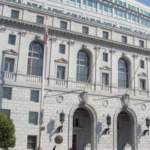
UC Berkeley Law Dean Erwin Chemerinsky, Professor Rebecca Wexler, and Criminal Law & Justice Center Executive Director Chesa Boudin recently filed an amicus curiae brief in a case now before the California Supreme Court that turns on whether a federal law prevents criminal defendants from subpoenaing evidence they need to defend themselves.
The brief, signed by 20 other law professors — including UC Berkeley Law Professors Colleen V. Chien ’02, Andrea Roth, Jeffrey Selbin, Elisabeth Semel, and Jonathan Simon J.D. ’87 Ph.D. ’90 — addresses the efforts by Adrian Pina, who’s accused of murder, to subpoena the deceased’s online posts and communications to support his argument of self-defense.
Meta, which owns Facebook and Instagram, and Snapchat parent company Snap fought Pina’s subpoenas, arguing that the federal Stored Communications Act (SCA), a privacy law that predates the advent of social media, bars them from handing the information over. Both the initial trial court and a state appeals court have sided with Pina, pushing the case to California’s highest court.
Chemerinsky, Wexler, and Boudin argue in the brief that the SCA’s silence on the situation posed by the case and whether it should trump California law should be read to infer that it doesn’t preempt the state’s evidence and criminal subpoena rules.
California law calls for courts to balance the competing interests — including privacy — against a defendant’s need for the information, they write. Accepting Meta and Snap’s assertion that the SCA should stop that process would effectively gut the subpoena power and “make meaningful defense investigation impossible in a growing percentage of cases,” they write.
“This Court should construe the Stored Communication Act’s ambiguous silence on criminaldefense subpoenas as consistent with California’s carefully crafted criminal procedures,” Chemerinsky, Wexler, and Boudin write. “The SCA should not be read as an unqualified, absolute bar on subpoenas for information that happens to be transmitted over the internet.”

UC Berkeley Law’s Center for Private Law Theory recently hosted the North American Workshop on Private Law Theory for the first time, welcoming a stellar group of scholars from around the world to discuss research works in progress.
The workshop’s 11th annual meeting included the revival of its John G. Fleming Award, given to University of Toronto Professor Ernest Weinrib for his contributions to tort law. His Fleming Lecture, on the seminal torts case Vincent v. Lake Erie Trans. Co., “ranged from Aristotle, to scholastic natural law, to the modern principle of proportionality,” says UC Berkeley Professor Mark Gergen, who served as a co-host for the meeting with Professor Hanoch Dagan, the founding director of the Center for Private Law Theory.
The conference was “a great success,” Gergen says, with “extended discussions of six papers on a broad range of subjects, including the function of equity in modern law, the tort of interference with contract, how we should think about differences in legal systems, the standards that govern fiduciaries, how Lon Fuller’s theory of forms can contribute to understanding intellectual property, and the law and principles that apply when government infringes on people’s rights as a matter of necessity.”
In addition to Dagan and Gergen, colleagues José Argueta Funes, Andrew Bradt, Seth Davis, Melvin Eisenberg, Christopher Kutz, and Molly Van Houweling joined the event, along with a number of postdoctoral fellows at the law school and Ph.D. students from the Jurisprudence & Social Policy Program.

As part of its annual Berkeley Forum for Corporate Governance, the Berkeley Center for Law and Business hosted an academic symposium focused on ESG — which stands for Environmental, Social, and Governance — topics in business law. In partnership with the European Corporate Governance Institute, the symposium included a Best Paper Award, which includes a $10,000 prize.
More than 70 articles were submitted by scholars from all over the world, and the finalists presented their work at the forum and the symposium. The winner in the senior category is “Green Gatekeepers,” by Luca Enriques, Alessandro Romano, and Andrew Tuch. In the junior (early career) category, two articles were recognized: “Expanding Shareholder Voice: The Impact of SEC Guidance on Environmental and Social Proposals,” by Kenneth Khoo and Roberto Tallarita; and “Private Profits and Public Business,” by Aneil Kovvali and Joshua Macey.

Stipulated protective orders, or SPOs, seal discovery information in a civil lawsuit from the public and have become increasingly common in recent decades. Federal Rule of Civil Procedure 26(c) permits these orders if the parties show “good cause” to the judge in the case.
But in a new paper in the Duke Law Journal using state-of-the-art machine learning techniques, Professor Jonah B. Gelbach and co-authors Nora Freeman Engstrom, David Freeman Engstrom, Austin Peters, and Aaron Schaffer-Neitz show that not only are these orders frequently granted, they’re rarely subjected to the type of judicial scrutiny the rule requires — hiding potentially deadly defects and abuse from the public.
The article, the first comprehensive examination of SPOs in federal litigation, analyzes more than 2 million cases. That analysis found that in cases where a protective order was issued, approximately 45% are the product of a jointly-filed motion — far more than previous estimates and growing. The authors estimate that 95% to 97% of these orders are granted, and more than half the judges in the dataset who considered at least 25 SPOs approved all of them.
The team bolstered their quantitative analysis with a qualitative review of 300 randomly selected grants and 100 randomly selected denials, which further supported the idea that judges are essentially a rubber stamp in most cases.
In the types of product liability suits where these orders are used, court-ordered secrecy can have major real-world consequences. Gelbach and his co-authors write that the list is long, from the faulty ignition switch on the Chevrolet Cobalt to the drugs Oxycontin and Zyprexa.
While opponents of greater transparency in litigation consistently assert these orders are rare, these results suggest they’re more common than previously thought, the group writes.
“Our findings add another example of how adversarialism may systematically fail to achieve key systemic ends. After all, there is no constituency for disclosure in a system in which parties interested in confidentiality place arguments before a passive judge who does not consider the public interest,” they write.
In economic terms, they add, there is a negative externality — a harm borne by persons whose interests the stipulating parties can freely ignore — and it’s accumulating.
“The adversarial structure of the American civil justice system might leave it ill-equipped to promote anything resembling an optimal level of openness,” they write. “Indeed, when a stipulated PO is at play, the plaintiff is not pitted against the defendant. By definition, the plaintiff and defendant, jointly, are pitted against the rest of us.”
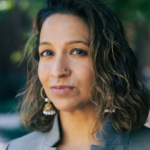
In a new policy brief for the Roosevelt Institute think tank, Professor Diana S. Reddy looks at recent innovations by the National Labor Relations Board (NLRB), which has created policies responsive to economic and institutional realities without the statutory reform many scholars and experts thought would be required to do so.
For more than 20 years, she writes, labor law scholars have lamented what’s known as the “ossification” of labor law and the brittle, outdated policies that created. Many have proposed significant blueprints for change. But Reddy argues that the emergence of workers interested in unionizing and a more proactive NLRB have made labor law more relevant and responsive than it’s been in decades, aided by a pro-union President Joe Biden.
Now, many of the board’s innovations are under attack, Reddy writes — from the courts, anti-union corporations, and politicians. But that opposition shouldn’t take away from what the board has accomplished while there was political will to do it.
“As it turns out, the state had much greater capacity to use existing legal authority to protect and support workers — all workers, unionized or not — than it had been using; what was missing was the political will to do so,” she writes. “Will the Board’s recent efforts survive? As a legal matter, they should. As a political matter, well, that depends on us.”

In a new mini-issue of the public affairs magazine Vital City about the ongoing crisis at New York City’s Rikers Island jail, Professor Emeritus Malcolm Feeley and Van Swearingen ’01 analyze the history of efforts to reform prisons and its lessons for today.
“From Plantation Prisons to the Modern Era” draws insights from the efforts by judges and special masters to dismantle Southern prisons originally modeled on plantations and mandate changes in California, Feeley and Swearingen propose the jurist handling the Rikers case appoint a receiver to take over.
“Considering the duration and the magnitude of problems at Rikers Island, it is surprising that a receiver was not appointed to take charge years ago,” they write. “But as obvious as it is, the process of getting from here to there is fraught.”
Feeley’s many books and scholarly articles include Judicial Policy Making and the Modern State: How the Courts Reformed America’s Prisons, published in 1998. Swearingen, who also earned a master’s from UC Berkeley’s Goldman School of Public Policy, specializes in litigating prison conditions for Rosen Bien Galvan & Grunfeld in San Francisco.
They note that in the Plata v. Schwarzzenegger case involving the delivery of medical services to inmates in the California prison system, Judge Thelton E. Henderson ’62 appointed a receiver to assume control of the process, and now even the state is asking the court to expand the receiver’s authority to cover mental health services as well. In light of this, Feeley and Swearingen conclude that persistently failing prisons and jails are like failing companies; in effect they should be declared bankrupt and placed in receivership. Given the seemingly intractable problems at Rikers, they recommend that the federal judge handling the case should in effect declare the jail bankrupt, and appoint a receiver with full authority to reorganize it from top to bottom.
Even in the hands of a receiver, Feeley and Swearingen argue, change is difficult and often takes many years. Yet it still rises to the top of the list of potential solutions, they write, and close with two questions: “Does a judge have the courage to make this appointment? And if so, who would take the job?”

What makes private law private? What is its domain, and the values it promotes? In a new book, Professor Hanoch Dagan and co-author Avihay Dorfman build on years of their scholarship to lay out a new approach to understanding some of society’s most important touchstones.
Relational Justice: A Theory of Private Law argues that private law should, and to a significant degree already does, abide by two fundamental commitments: reciprocal respect for self-determination and substantive equality. That’s the core of what Dagan and Dorfman call “relational justice.” In identifying the features of their theory and outlining its guidelines, the authors also explain their opposition to the dominant schools of private law theory, whether they take the private law category seriously or marginalize its significance.
“Our liberal theory of private law does not provide a set of blueprints or a detailed description of prevailing doctrines in a specific jurisdiction,” Dagan and Dorfman write. “It aims to offer a framework for the critical study of private law that can guide its interpretation, development, and reform, a significant undertaking given that private law is indispensable and public law, even in its most generous and liberal version, does not suffice.”
Relational Justice is the eighth book for Dagan, who’s the founding director of the Berkeley Center for Private Law Theory and has written more than 130 scholarly articles. It’s drawing rave reviews: Yale Law Professor Daniel Markovits calls it “hugely creative and ambitious,” while University of Muenster Professor Thomas Gutmann says it’s “the best book we have, not just on the distinctive significance and core intellectual principles of private law, but on its heart and soul.”

The Honorable G. William and Ariadna Miller Institute for Global Challenges and the Law has been selected from more than 100 nominees as a winner of one of the East Bay Chapter of the United Nations Association’s 19th Annual Global Citizen Awards. Professors Laurel Fletcher and Katerina Linos, the institute’s co-directors, and Toni Mendicino, the institute’s administrator, will receive the honor at the association’s U.N. Day celebration on Nov. 3.
The theme for both the commemoration and this year’s awards is “Peace, Democracy, and Law.”
“Having considered many nominees that contribute to these goals, our judging panel concluded that you individually and the Institute are exemplary due to your outstanding record of teaching, research and advocacy,” Herb Behrstock, a member of the association’s executive committee, wrote to Miller leadership team.
Past honorees include U.S. Rep. Barbara Lee and the UC Berkeley Human Rights Center.
“The UNA East Bay Chapter has a long and proud history of promoting universal values of human dignity in our community,” Fletcher says. “It’s truly an honor for Miller to be recognized in this way.”
The Miller Institute is an internationally-focused research and policy center that uses interdisciplinary collaborations and institutional partnerships to address urgent challenges that demand innovative global approaches, including promoting the rule of law, climate and energy justice, anti-corruption efforts, and human rights. The center also administers the Certificate of Specialization in International Law Program for Berkeley Law students.
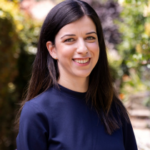
In a new essay in the Harvard Law Review’s blog, Professor Elena Chachko explores the impact of the U.S. Supreme Court’s most recent term on internationally informed agency action — the many regulations that incorporate international standards, implement U.S. international commitments, or reflect foreign policy interests.
Before the four recent decisions Chachko dubs the “anti-regulation quartet” — Loper Bright Enterprises v. Raimondo, SEC v. Jarkesy, Corner Post v. Board of Governors of the Federal Reserve System, and Ohio v. EPA — agencies had greater doctrinal leeway to consider international factors not explicitly authorized by statute than purely domestic ones. That baseline has now shifted, she argues.
It’s too soon to know exactly how much these cases will impact the international administrative state, Chachko writes, but internationally informed regulation motivates a unique set of doctrinal and constitutional questions that require careful analysis.
“What is clear is that the Supreme Court has destabilized the legal framework that governs this area in ways that create more space for anti-internationalist positions from both judges and litigants, separate and apart from the effect the recent cases will have on agencies writ large,” she writes. “A key factor that will shape the development of the law in this area moving forward is how the Court will balance its idea of a powerful foreign affairs presidency with its skepticism of the administrative state.”
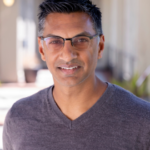
Professor Prasad Krishnamurthy spoke at a recent conference organized by the Federal Reserve Banks of Dallas and Atlanta gathering academics, bankers, and policymakers to discuss the fallout from a series of bank failures in spring 2023 and offer prescriptions for avoiding future issues.
Krishnamurthy, who holds an Ph.D. in economics as well as a J.D, discussed some of the potential costs associated with making changes to the current deposit insurance system.

Berkeley Law’s Paper Prisons Initiative, led by Professor Colleen V. Chien, recently unveiled an innovative database aimed at helping defendants and people convicted of crimes challenge a charge, conviction, or sentence under the California Racial Justice Act (RJA).
The initiative’s Racial Justice Act Tool, which is currently in beta mode, reports on data provided by the California Department of Justice’s Criminal Offender Record Information (CORI) database of arrests, court actions, convictions, and sentences in California. Users can sort by a variety of variables, including the race of a defendant, what they were charged with, the county where it happened, and the year.
Chien outlines the tool’s value in a paper published in the Berkeley Journal of Criminal Law (BJCL) earlier this year with Santa Clara Law Professor William A. Sundstrom, web developer Yabo Du, Santa Clara University computer science graduate student Akhil Raj, and Berkeley Law students Bennett Cyphers ’25 and Rayna Saron ’24. All are members of the initiative, a grant-funded research project Chien founded and leads which combines data science and law to address and advance economic and racial justice through research on the second chance gap.
The journal volume collects scholarly work from BJCL’s spring Racial Justice Act Symposium, which gathered expert lawyers, computer scientists, scholars, government officials, criminal justice nonprofit leaders and students to examine the law’s early implementation and implications.
Enacted in 2020, the RJA prohibits bias based on race, ethnicity, or national origin in charges, convictions, and sentences issued in court. It permits a challenge to a criminal conviction if a judge, attorney, law enforcement officer, expert witness, or juror exhibited bias or animus towards the defendant because of their race, ethnicity, or national origin — or used racially discriminatory language during the trial.
To make a case for relief on the basis of a pattern of racial disparity, however, the law requires evidence of this disparity, which is often hard to come by for individual defendants. The tool makes it possible to access data supporting a prima facie case, leveling the playing field and enabling more people to assess and bring their potential claims.
The data can also reveal insights about the law and its potential limitations. For example, it required that the comparisons be for cases where defendants are “similarly situated” and in the “same county” — a bar that can be too high in smaller jurisdictions, Chien and her co-authors write, to tease out valuable information about bias.
For example, they find that for 16 counties with small Black populations, not a single offense has a large enough number of arrest incidents in 2019 for the data to be reportable. Later in the criminal cycle, no comparison of Black defendants involving felony convictions is possible in more than three-quarters of the state’s counties.
The online tool breaks down differences among races for different offenses and various stages of the criminal process and differentiates between California’s 58 counties. Using statewide data can help solve the problem of tiny sample sizes and help the law meet its ultimate aims, they write.
“The California Racial Justice Act holds considerable promise as a tool for identifying and remedying racial disparities in the criminal justice system, but its potential has been constrained by the lack of data needed to detect the presence or absence of an actionable disparity,” they write. “If the RJA is to have its intended impact of ‘eliminating racial bias’ from the criminal justice system, its evidentiary standards cannot be so strict as to make it nearly impossible to demonstrate a disparity except for the most common offenses in the most populous counties and racial groups.”
The project also just introduced two other RJA-related elements: a blog with first-person stories from incarcerated people and their families and friends that’s a partnership with Berkeley Law’s Criminal Law and Justice Center and a diary feature as another avenue for amplifying the voices of those who are using the tool.

Professor Dylan Penningroth’s book Before the Movement: The Hidden History of Black Civil Rights has won the 2024 Scribes Book Award and made the shortlist for the 2024 Cundill History Prize. They’re the latest in a long string of accolades and honors.
The book explores the larger picture of how Black people worked within the laws of property, contracts, marriage and divorce, business and religious associations, and more to assert their rights — even while other parts of the legal system offered discrimination, hostility, and violence.
The Scribes award is given by the American Society of Legal Writers. The Cundill honor, administered by McGill University, is considered the world’s leading prize for history writing and comes with a $75,000 award. The winner will be named as part of the Cundill History Prize Festival on Oct. 30.
Since its publication last fall, Before the Movement has racked up a number of awards, including Law & Society Association’s J. Willard Hurst Book Prize, the David J. Langum, Sr. Prize in American Legal History or Biography and two — the Merle Curti Social History Award and the Ellis W. Hawley Prize — from the Organization of American Historians. The book was also shortlisted for the Lynton Prize and the Stone Book Award from the Museum of African American History.
“Before the Movement masterfully achieves an impossible feat: it uses a wide and unwieldy archive alongside personal reflective narrative to offer a clear and compelling argument about law’s experience in the lived world,” the Hurst Prize citation says. “This book is at the core of what groundbreaking law and society historical scholarship is — it is engaging and accessible while expanding our understandings about an important topic, and it reflects deep and pain-staking research to bring alive archives that would otherwise go unnoticed. In bringing alive the ‘legal consciousness’ of people in their everyday interactions of the law (i.e., mundane disputes and cases), Professor Penningroth offers a more nuanced and fuller dimension to the history of Black civil rights in the United States before it was categorized as one.”

An article by two scholars affiliated with our California Constitution Center (CCC) has just been published as the lead piece in a special Boston University Law Review Online issue collecting work presented at the Advancing Pregnant Persons’ Right To Life Symposium earlier this year.
“The Free Exercise Right to Life,” by CCC Executive Director David A. Carrillo, center senior research fellow Allison Macbeth, and Daniel Bogard, explores the impact of the U.S. Constitution’s Free Exercise Clause on abortion access in the aftermath of the U. S. Supreme Court’s decision in Dobbs v. Jackson Women’s Health Organization, which overturned Roe v. Wade and put abortion rights issues in the hands of state legislatures. Bogard is a Senior Rabbinic Fellow of the Shalom Hartman Institute and adjunct faculty at Eden Theological Seminary.
The February 2024 symposium gathered scholars from the legal, medical, and religious fields to consider ways to promote and protect reproductive justice through advancing the pregnant persons’ right to life. It was hosted by the law review, the Boston University School of Law Program on Reproductive Justice, the Northeastern Law Center for Health Policy and Law, and the Center for Reproductive Rights.
Even after Dobbs, elements of the Constitution remain in play, Carrillo, Macbeth, and Bogard argue, particularly the First Amendment’s Establishment Clause — which bars the government from making any law “respecting an establishment of religion” — and free exercise clause, which protects the right to practice one’s religion as one pleases.
Restrictions on abortion trigger the question of free exercise rights because some religions have doctrines that can require their followers to choose the pregnant person’s life over an unborn life, they write, using Modern American Judaism as their prime example. Because Jewish law dictates that the existing life of the pregnant person must take precedence over the potential life of the fetus, “many rabbis insist that there are times when abortion is not just permitted in Judaism but required by Jewish law,” the article argues. “Thus, laws limiting access to abortion services abridge the religious liberty of American Jews.”
In addition, if a law restricting abortion is intended to codify a Christian value, that conflicts with the free establishment clause by imposing one religion’s views on adherents to all other faiths and preventing members of religious minorities from freely practicing their beliefs. Similarly, the right to free exercise of religion can require states to allow abortion or contraception access to those with a sincerely held belief that their religion requires it.
“In the aftermath of Dobbs, it appeared that no federal constitutional abortion questions remained and that states were left alone to legislate about abortion rights,” Carrillo, Macbeth, and Bogard write. “But free exercise rights are a previously dormant spark that can reignite the federal constitution’s role in abortion, at least where a person’s sincere religious beliefs (like those long held in American Judaism) compel it.”

An article by Professors Steven Davidoff Solomon and Adam Badawi and Berkeley Center for Law and Business Senior Fellow Matthew Cain has been recognized as one of the top 10 corporate and securities articles of 2023 by Corporate Practice Commentator. It’s the eighth time on the annual list for Solomon and the second for Badawi.
Their article, “Does Voluntary Financial Disclosure Matter? The Case of Fairness Opinions in Mergers and Acquisitions,” was published in the Journal of Law and Economics. In the article, Solomon, Badawi, and Cain use changes in Delaware’s disclosure requirements for fairness opinions in tender offers to assess the impact of voluntary versus mandatory disclosure, analyzing more than 900 offers from 1995 to 2019.
They find that the shift from voluntary to mandatory disclosures for tender offers rose steadily as Delaware courts pushed harder for details to be revealed — and that pro-shareholder changes to these offers were associated with disclosed only under the voluntary standard. Their results show the difficulty of predicting the effects of changes in the disclosure rules.
The annual list, selected by teachers in corporate and securities law, drew from a pool of more than 400 articles.
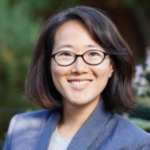
Professor Emily Rong Zhang is one of the first recipients of Public Agenda’s Democracy Renewal Project grants — which are funding studies that show how to reach universal access to elections while strengthening trust and confidence in one of democracy’s core mechanisms.
In partnership with the Alliance for Safety and Justice, Zhang and Naomi Sugie of the University of California, Irvine, will expand the scope of Project VOICES. The initiative is a randomized controlled trial testing text-messaging interventions to enhance political participation among individuals with criminal records and their families. Zhang and Sugie will analyze whether this kind of outreach from trusted messengers can build trust among a constituency that’s been historically underrepresented among voters.
The Democracy Renewal Project grants were chosen through a competitive process and evaluated by a panel of experts, timed to allow scholars to gather data from the 2024 election cycle. They were awarded to researchers at a variety of other top institutions, including Yale University, the University of Pennsylvania, and the University of Texas.

In a recent article in the Emory Bankruptcy Developments Journal, Professor Kenneth Ayotte and Alex Zhicheng Huang, a Robbins J.S.D. Fellow, analyze how “debtor-in-possession” (DIP) loans, which are intended to help a company finance its bankruptcy case, are effectively reorganization plans in disguise. Often, the DIP lenders becomes the creditors that win what they describe as the “golden ticket”: the ability to control the bankruptcy case and decide on the payoffs to creditors in the reorganization plan. But while this process can preserve the company, it works against the respect for priorities, a main goal of the bankruptcy system.
Using the 2020 J.C. Penney bankruptcy as a case study, they estimate that a standardized, unbundled DIP loan would have required an interest rate of at least 545% to give the majority group the same payoff — far higher than any judge would be likely to approve. These sub rosa processes must be made more transparent to protect priorities, they argue.
“If lenders want approval of a first-priority loan with a 545% interest rate, they should be forced to present this transparently to a court, Ayotte and Huang write. “We think judges would be much more likely to push back against extreme terms like these when the true cost is brought to light.”

Professor Rebecca Wexler recently testified before the U.S. Senate Judiciary Committee’s Subcommittee on Criminal Justice and Counterterrorism at a hearing on the use of artificial intelligence in criminal investigations and prosecutions.
“Although AI tools present exciting opportunities to render the legal system more accurate and equitable in some respects, they also, in their current form and use, present troubling obstacles to fair and open proceedings,” she told senators.
To help fix the problem, Wexler said, Congress should do two things: Require AI tools be available for auditing by independent researchers and also stop both prosecutors and defense attorney from invoking the trade secret privilege to block access to relevant evidence. That evidence should be required to be disclosed, she added, under reasonable conditions to protect the interests of the company that produced the technology.
Wexler, who has written extensively about data, technology, and secrecy in the criminal legal system, is a faculty co-director of the Berkeley Center for Law & Technology and was a senior policy advisor at the White House Office of Science and Technology Policy during the spring of 2023.
In her testimony, Wexler gave several examples of tech-enabled evidence with problems. At least six people, she said, have allegedly been wrongfully arrested or jailed after being identified by AI-based facial recognition software. And UC Berkeley researchers Hany Farid and Sarah Barrington recently found that an AI-trained system for estimating height and weight from a photo of a person yielded worse results than work done by a person with no special training.
“Allowing A.I. to enter criminal courtrooms without sufficient scrutiny is dangerous,” Wexler said. “While A.I. has the potential to improve law enforcement efficacy, it can also cause harmful errors with high-risk high stakes consequences for life and liberty.”

In a recent Politico op-ed, Professor Tejas N. Narechania and co-author Ganesh Sitaraman argue that the same regulatory levers governments already use to govern utilities and other essential services should be a template for new rules for the burgeoning AI sector.
The biggest companies now pouring money into AI — including Amazon, Google, and Microsoft — have all been sued for anticompetitive tactics, Narechania and Sitarmaran write, and are “poised to control” a broad new swath of innovation.
The op-ed builds on a forthcoming article by Narechania, a faculty co-director of our Berkeley Center for Law & Technology, and Sitaraman, a Vanderbilt professor.
“Leaving the development of such a revolutionary technology to a few unregulated mega-corporations is short-sighted at best and dangerous at worst. While AI might be new, the problems that arise from concentration in core technologies are not,” they write. “To keep Big Tech from becoming an unregulated AI oligopoly, we should turn to the playbook regulators have used to address other industries that offer fundamental services, like electricity, telecommunications and banking services.”
Their concerns stem from control over the “AI stack,” which is akin to a supply chain for AI applications. At the bottom are the microprocessing chips, topped by the cloud server farms that provide the massive computing power needed to train an AI foundation model. Those models then power specific products: ChatGPT, for example, is embedded in Microsoft’s Bing search engine.
Amazon holds a huge swath of the cloud server market, while Microsoft has a 49% stake in Open AI, the parent of ChatGPT. With other companies dominating the chip manufacturing and another design, it’s easy to imagine how smaller competitors at every level of the stack could be squeezed out or have their ideas swiped by the big players.
One possible regulation Narechania and Sitaraman suggest is “structural separation,” or not allowing companies to hold a piece of multiple layers of the stack. Another is the idea of nondiscrimination, like net neutrality: If Comcast is your internet provider, it’s required to give you equal bandwidth for Netflix and Peacock, a subsidiary.
The co-authors also envision the possibility of a public option for cloud computing, which could “serve government agencies and researchers who want to solve public problems, rather than using AI to make tech platforms even more addictive.” It also would almost certainly lower costs for new AI developers.
Lawmakers have a toolbox at the ready, Narechania and Sitaraman conclude. But will they use it?
“We have spent two decades learning the hard way what happens when tech companies have unchecked, unregulated power to swallow up markets and eliminate competition,” they write. “The rise of AI offers what might be our last, best chance to get this power under control.”
Narechania also attended a recent White House meeting on competition policy and AI.

Professor Robert Merges’ latest book, American Patent Law: A Business and Economic History, offers a comprehensive recounting of the U.S. patent system from 1790, with an emphasis on how patents have been used by private enterprise for the pursuit of business goals. It highlights how Congress and the courts have adapted patent rules to support socially beneficial business practices, and tried (at times successfully) to modify those rules to re-channel investment and effort away from socially harmful practices, such as extortionate litigation.

Law & Society Review, the publication of the Law & Society Association, published a special memorial issue to honor Professor Lauren Edelman ’86, who died in February. Edelman was deeply involved with the interdisciplinary organization for sociolegal scholars, and served as its president in 2002-03.
Several of the works were written by Edelman’s faculty colleagues and former students, including Diana Reddy Ph.D. ’23, who joined our faculty this summer.
“Faculty members, students, policymakers, practitioners, and laypersons will learn from Laurie Edelman’s brilliant scholarship for generations to come,” write Professors Catherine R. Albiston ’93, Calvin Morrill, and Osagie K. Obasogie, who worked closely with Edelman through the school’s Jurisprudence & Social Policy (JSP) Program. “She developed not only a new theory and a conceptual vocabulary for understanding the interplay of law and organizations — think, ‘legal endogeneity,’ ‘managerialization of law,’ or ‘symbolic structures’ — but also a more precise account of the mutual influence between law and society.”
Two of the three editors of the issue, Ashley Rubin Ph.D. ’13, and Shauhin Talesh Ph.D. ’11, are JSP alumni and share their personal experience of Edelman as a mentor.
“These essays collectively reveal the arc of a person who devoted herself to scholarship, teaching, service, collaboration, and mentorship at the highest levels,” Rubin, Talesh, and Katharina Heyer write. “Whether the contributing authors to this special memorial issue were former students, collaborators, colleagues, or professional associates, they all highlight how much they learned from Laurie and how much they benefited from her presence in their lives.”

In a recent essay in California Law Review, Professor Abbye Atkinson explores how our society encourages a “consumerist vision of American belonging” that’s often fueled by credit and other borrowing while debt policies and norms are intentionally marginalizing and exclusionary toward distressed debtors.
Atkinson, whose scholarship focuses on the law of debtors and creditors as it affects marginalized communities, argues that if credit-and debt-based consumption is wrapped up in the idea of belonging, policies involving them must expand beyond their dominant economic orientation.
“A belonging approach would not ignore or automatically supplant these and other market concerns,” she writes. “Instead, it would require that, in addition to the traditional economic analysis, policymakers also consider the role of credit/debt-based consumption as a source of social well-being and dignity, affirmatively balancing these two interests accordingly. Conflict and tensions are certain to quickly materialize, but engaging in the work of acknowledging and addressing the positive dignitarian aspects of credit/debt consumption is vital, at a minimum, to the well-being of disadvantaged groups who must engage in self-help social welfare in the consumer credit/debt markets.”

Lecturer James Dempsey was just sworn in as one of eight judges on the federal Data Protection Review Court. Dempsey, a former executive director of the Berkeley Center for Law & Technology, teaches Cybersecurity Law Fundamentals in the LL.M. program and authored a book with the same name.
U.S. Attorney General Merrick Garland, who swore in the judges, established the court last year within the Office of Privacy and Civil Liberties at the Department of Justice. The court is part of a broader executive order that established a two-tiered process to ensure independent and impartial review of certain complaints submitted by people outside the U.S. who claim their personal information was collected in violation of American laws during U.S. signals intelligence activities.
The new policy is considered a critical part of the European Union-U.S. Data Privacy Framework and the United Kingdom-U.S. Data Bridge Extension, both of which reflect a share commitment to respecting individual privacy amid national security efforts.
The court will review findings made by the Civil Liberties Protection Officer of the Office of the Director of National Intelligence in response to qualifying complaints. The decisions of each three-judge panel are final and binding.
Judges serve four-year terms and are independent of the attorney general and Department of Justice.

Leaders from the California-China Climate Institute (CCCI) helped plan and support Gov. Gavin Newsom’s recent trip to China, which included a meeting with President Xi Jinping — the first visit there by a Golden State governor since 2017.
Institute Director Fan Dai (left, with Newsom) collaborated closely with the national and provincial governments to create opportunities for discussions and developing climate-focused partnerships within China, which is responsible for almost a third of the world’s total greenhouse gas emissions.
Chaired by former Gov. Jerry Brown, CCCI is a collaboration between Berkeley Law’s Center for Law, Energy, & the Environment and UC Berkeley’s College of Natural Resources. It’s become a key space for climate experts in both California and China to partner and exchange ideas as each attempts to navigate the climate crisis.
California already had Memorandums of Understanding (MOU) with China’s Ministry of Ecology and Environment and Hainan Province. CCCI serves as the secretariat for those agreements, organizing policy training sessions where experts and professors from California are invited to lecture Chinese policymakers about crucial issues such as climate change, energy decarbonization, and methane mitigation.
During the trip, Newsom signed another MOU with Chairman Zheng Shanjie of the National Development and Reform Commission, China’s central macroeconomic central planning agency, to bolster efforts to accelerate a transition to clean energy and achieve carbon neutrality. He inked similar agreements with Guangdong, Jiangsu, Shanghai and Beijing.
CCCI also co-hosted the Great Wall Climate Dialogue — attended by Newsom and top state officials alongside senior leaders from China’s environmental ministry and Guangdong, Hainan, Inner Mongolia, Jiangsu, and Sichuan provinces — and supported the development of the “Declaration of Enhanced Subnational Climate Action and Cooperation Between the State of California and the People’s Republic of China,” the first declaration of its kind between China and a subnational government.
The institute is also hosting and fostering climate-focused exchanges between California and Chinese officials during Minister Xie Zhenhua’s visit to the state and the Asia-Pacific Economic Cooperation Summit in San Francisco from November 11-17.
“Governor Newsom’s trip is exactly what’s needed right now and the institute was proud to help make it happen,” Brown says.

Professor Emerita Eleanor Swift — a pathbreaking Evidence scholar who was both a trailblazer for women in legal academia and a beloved mentor to countless students — died Sept. 20, Berkeley Law Dean Erwin Chemerinsky announced. Swift joined the faculty in 1979 and retired from teaching in 2014.
In an email to the law school community, Chemerinsky noted Swift received the school’s Rutter Award for Teaching Distinction as well as UC Berkeley’s Distinguished Teaching Award and served as associate dean under Herma Hill Kay. Over many years, she played “a crucial role in the development of every aspect of the law school’s clinical, skills, and legal writing programs.”
“None of this begins to capture how vital she was to Berkeley Law and the Berkeley campus for decades,” Chemerinsky wrote, adding that the school will hold a memorial service for Swift.
The fifth woman hired to the law school’s faculty, Swift became an eminent scholar, particularly in Evidence. She also made it her mission to mentor women, both inside the classroom and in her research field. She twice chaired the Evidence Section of the Association of American Law Schools, and received the 2022 John Henry Wigmore Award for Lifetime Achievement from that section. For all her public achievements, it was her devotion to creating the clinical programs and her personal inspiration of students and her mentoring of younger women faculty that most capture her career.
“She has inspired generations of female law professors to ‘think big’ and enter an area of research that has historically been shaped by the work of male law professors,” Penn Law Professor Jasmine E. Harris said.
Add your memories to this In Memoriam page for Professor Swift.

In a new article in Science, Professor Pamela Samuelson examines the copyright questions raised by the rapid development of generative AI, particularly through lawsuits brought by visual artists and writers.
These suits allege making copies of in-copyright works to train generative AI models is an infringement, as are outputs of these systems. Many in creative industries are worried that AI-generated images, writing, and music will undercut the need for human artists.
The current argument is a new version of a familiar story, Samuelson writes, from player pianos to VCRs and photocopiers. If generative AI seems poised to be more disruptive than previous technologies, one factor is the the rapid pace of its development. Evolution in the law and policy often lags behind, she explains and it can be difficult to calibrate how to balance competing copyright interests in the early stages of development — not to mention accounting for different laws across the globe.
In addition to the lawsuits, Congress is exploring the issue and the U.S. Copyright Office is planning to seek public comment ahead of releasing its own analysis. Scientists with an interest in generative AI would be wise to weight in, Samuelson writes.
“If the plaintiffs prevail, the only generative AI systems that may be lawful in the U.S. would be those trained on public domain works or under licenses, affecting everyone who deploys generative AI, integrates it into their products, and uses it for scientific research,” she writes.
Samuelson also gave the final talk of the UC Berkeley Distinguished Lectures on the Status and Future of AI in April addressing some of the same concerns.
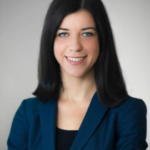
In a post on “Notice & Comment,” a blog published by the Yale Journal on Regulation, Professor Elena Chachko explores how the Biden administration is bringing international considerations into the regulatory process more than ever before within a broader effort to modernize regulatory review.
The move, part of an evolution begun during the Obama administration from prioritizing efficiency as the main purpose of international consideration toward an emphasis on epistemic and global-welfarist advantages, means Americans’ welfare is not the only thing that counts, she writes. But that could come into conflict with the U.S. Supreme Court’s recent decisions that limit administrative discretion — a dynamic she considers more deeply in an upcoming article.
The Biden administration’s push “puts a thumb on the scale in favor of internationalizing U.S. domestic regulation in meaningful ways. It continues the transition from an efficiency-focused view of regulatory analysis to a global-welfarist one,” Chachko writes. “It is an important innovation, but one that is likely to face significant implementation problems not least because of the potential executive-judicial tension regarding unilateral agency recourse to international considerations.”

Professor Peter S. Menell and Berkeley Judicial Institute Executive Director Jeremy Fogel collaborated with the World Intellectual Property Organization (WIPO) in conceiving, designing, and advising “An International Guide to Patent Case Management for Judges,” which was recently released. The guide includes an overview of the patent system in each of the major patent nations and the European Patent Office, as well as explanations of the roles of the judiciary and patent offices. Each chapter covers specific aspects of the civil patent litigation process, such as early case management, discovery, and remedies. Users can access the whole guide or build a custom road map from the offerings.
Menell and Allison Schmitt ’15, who directs the Berkeley Center for Law & Technology’s Life Sciences Project, co-wrote the chapter on the United States. WIPO is a specialized agency of the United Nations that serves as a global forum for intellectual property policy, services, information and cooperation.
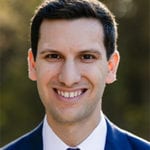
Writing in the Boston Review, Professor Jonathan S. Gould and co-author Jacob S. Abolafia compare the discourse about judicial review in the United States and Israel, particularly how the political left in each country has diverged. In the U.S., the left is turning against judicial review as the judiciary — particularly the U.S. Supreme Court — has moved to the right. In Israel, left-leaning protesters have filled the streets to support judicial review as key to preserving the country’s democracy.
The contrast raises more fundamental questions about the relationship between democracy and judicial review, they write.
“Judicial review will sometimes be a critical check on rash government action and safeguard of the interests of marginalized demographic minorities. But it will sometimes prevent legislation that would advance the public interest and set back efforts of the elected branches to protect minorities that have successfully gained a measure of political power,” they write. “The difference will turn on government structures, social context, and political culture.”
Gould and Abolafia argue that at the moment, those features mean judicial review plays a larger and more important role in Israel than at home, but the current status isn’t static.
“In evaluating the importance of judicial review in any country, we shouldn’t succumb to sloganeering about the goodness or badness of courts as a general matter,” they write. “Rather, we need to look carefully to what role courts play in a particular context, recognizing that judicial review is more important in some polities than in others.”

Professor Victoria Plaut’s landmark 2010 paper “Diversity Science: Why and How Difference Makes a Difference” is the focus of a special issue of the American Psychological Association journal Cultural Diversity and Ethnic Minority Psychology. In the volume, researchers reflect on the pathbreaking article — which lays out some of the central elements of diversity, equity, and inclusion sciences — and consider where the field should go in the future.
“The 11 articles in this special issue answer the call to advance innovative theory and methods for the next generation of diversity and inclusion science, building on Plaut’s seminal work,” a group of scholars write in the volume’s introduction.
Plaut, a social and cultural psychologist, joined the Berkeley Law faculty in 2009 and is currently serving as UC Berkeley’s vice provost for the faculty.

A poignant remembrance of David Lieberman, written by fellow Berkeley Law professor and legal historian Christopher Tomlins, has been published in The Docket, the electronic supplement of Law & History Review. Lieberman, who died in a tragic hiking accident on Sept. 10, 2022, was a revered educator, eminent scholar, and trusted colleague who received numerous honors and fellowships. He joined Berkeley Law’s faculty in 1984, chaired several of its committees, served as associate dean of the school’s Jurisprudence and Social Policy Program, and took emeritus status on July 1. In his remembrance, Tomlins recalls “how much good David left behind him, and how much those he left might gain from his example, if we try.”

Professor Sonia Katyal won a Dukeminier Award for her article “The Gender Panopticon: AI, Gender, and Design Justice,” published last year in the UCLA Law Review. She’s the first scholar to land one of the annual honors — recognizing the best papers on sexual orientation and gender identity law — three times. A special issue collecting this year’s honored papers has just been published.
Written with Jessica Y. Jung, then a UC Berkeley undergraduate, the article argues that society needs to grapple with reality that the dynamic between artificial intelligence and gender is far more complicated than current laws suggest, and has a particular impact on lesbian, gay, bisexual, transgender, and queer (LGBTQ+) communities. While the law is increasingly embracing more visibility around gender identities and fluidity, they say, there’s a parallel increase in surveillance technologies that aren’t capable of working beyond strict male and female classifications.
The article draws on philosopher Jeremy Bentham’s concept of the panopticon — a prison design with a central guard tower, to create an illusion of being alone in each cell but ensuring a feeling of being constantly watched. That sensation prompts prisoners to change their behavior.
As the development of AI applications continues, it’s possible to take steps toward entitling, embedding, and encoding gender self-determination, both on social media and in real space, Katyal and Jung conclude.
“When a binary system of gender merges with the binary nature of code, the result fails to integrate LGBTQ+ communities, particularly nonbinary and transgender populations, erasing them from view,” they write. “ The question for legal scholars and legislatures is how technology can and should respond to this complexity.”

Professor Paul M. Schwartz’s article “Privacy and/or Trade,” which was just published in the University of Chicago Law Review, has been named one of this year’s winners of the 13th annual Privacy Papers for Policymakers awards. Given by the nonprofit Future of Privacy Forum, the awards recognize scholarship that’s useful to policymakers within the United States Congress, federal agencies, and international data protection authorities.
The winners will present their work at an event hosted by the organization in Washington, D.C., in February.
The article, co-authored with Georgetown Professor Anupam Chander, traces the way international privacy and trade law, which were developed together, have diverged and now are in clear conflict with one another.
“Will trade be the death of data privacy, as international flows of personal information across the world place our privacy at risk?” they ask. “Or will data privacy be the death of trade, as restrictions on information flows make modern trade increasingly difficult?”
In a major empirical finding, Schwartz and Chander find that 61 countries outside the EU have created their own “adequacy” standards for international data transfers. This splintering of the adequacy approach threatens global data trade. In response, Schwartz and Chander propose a number of policy approaches, including the development of a global privacy agreement, which would be hammered out by the World Trade Organization to protect privacy while avoiding the possibility of different countries throttling the movement of data.
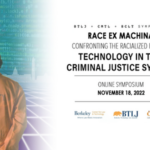
The Berkeley Center for Law & Technology, the Berkeley Technology Law Journal, and the student group Coalition of Minorities in Technology Law recently partnered on the third edition of a symposium focused on race and technology law. “Race Ex Machina: Confronting the Racialized Role of Technology in the Criminal Justice System” examined how techniques and instruments like predictive policing, pretrial risk assessment, and algorithmic sentencing tools can replicate racial bias, while intellectual property protections can make understanding and challenging their use difficulty. The day-long symposium featured panels on the reliability and legitimacy of these new products and procedures, the privacy implications — particularly for Black and brown communities — and potential policy and regulatory solutions. The speaker lineup included a wide range of academics and policy advocates, including keynote speaker Professor Vincent Southerland of NYU Law and Berkeley Law Professors and BCLT Faculty Co-Directors Andrea Roth and Erik Stallman.

Professor Emeritus Melvin Eisenberg’s new book, Legal Reasoning, has just been published by the Cambridge University Press. The book explains and analyzes the modes of reasoning used by courts in making and applying common law rules. New York University Law Professor Jeremy Waldron calls the book “an illuminating overview of the common law” that’s “beautifully structured, briskly argued, and gracefully illustrated with dozens of cases.” It’s the latest in an astounding series of books and articles by Eisenberg, who joined the Berkeley Law faculty in 1966. His legal service stretches back over more than half a century, including stints as an assistant counsel for the Warren Commission, which investigated the assassination of President John F. Kennedy, and assistant corporations counsel of New York City.
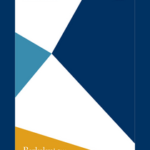
The 2022 Recent Faculty Scholarship brochure has just been published, showcasing the newest articles and books from our professors as well as highlights from our research centers and institutes and brief profiles of our newest faculty members. “Legal scholarship matters,” Dean Erwin Chemerinsky writes in his introductory letter. “Although it may take many different forms and reach a variety of audiences, writing by law professors influences the development of the law, educates students across the country, and advances knowledge about the legal system.”

A new report published by Berkeley Law’s Center for Law and Work (CLAW) and the UC Berkeley Labor Center finds Amazon’s recently announced “freedom of association policy” doesn’t meet international human rights standards for workers involved in union organizing.
Authored by international labor law expert Lance Compa, Failure to Deliver: Assessing Amazon’s Freedom of Association Policy under International Labor Standards is a legal analysis of Amazon’s March 2022 policy, which pledges to fulfill International Labor Organization (ILO) and United Nations norms protecting the rights of organizing workers, even when an individual nation’s labor laws don’t require those standards to be met. Amazon’s policy is, in fact, not compliant with those global norms, Compa finds, and the anti-union campaign tactics used by Amazon management continue to violate international standards.
Amazon’s policy makes no specific reference to ILO Conventions 87 and 98, which Compa calls the “polestar international standard” and prohibit interfering with organizing efforts through pressure, threats, or discrimination. Amazon’s own campaigns, however, have aggressively sought to impose pressure and spark fear in workers considering supporting union representation.
“The findings of this analysis should prompt Amazon to develop a genuine freedom of association policy that safeguards workers’ organizing rights and moves the company toward a healthy collective bargaining relationship when its employees choose union representation,” says Professor Catherine Fisk, Berkeley Law professor and CLAW’s faculty director.

A collaboration between the Berkeley Center on Comparative Equality and Anti-Discrimination Law and the Open Society Justice Initiative has produced a fresh update of a policy brief tracking the rise of restrictions on religious dress across the European Union, particularly bans on Muslim women wearing headscarves, face veils, or other clothing items. While only nine of the 27 members of the EU and the United Kingdom have national bans on religious dress worn by Muslim women, private or institutional restrictions exist in 16 nations. The report tracks the arguments used to justify the restrictions — including post-9/11 concerns about national security, gender equality, a desire for assimilation, and religious neutrality — and how courts have responded.
The brief also includes a raft of recommendations for governments, the courts, EU member states, and nonprofit funders to reject bans that curtail Muslim women’s ability to access jobs, education, services, and move freely in public spaces.
Berkeley Law Professor David B. Oppenheimer, the director of the center, supervised students who helped revised the chapters on individual countries, including Renee Coe ’23, Clara Dorfman ’22, Molly Haley ’22, John Karim ’22, Phoebe Lavin ’22, Alyssa Mejia Whisler ’23, José Fernando Rengifo LL.M. ’22, Rana Sahar ’22, and Daryl Yang LL.M. ’22.
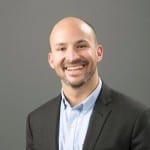
A new case study from Adam Sterling and two colleagues from UC Davis tracks how Veeva Systems became the first publicly-traded firm to convert to a Public Benefit Corporation. Unlike most for-profit companies, which generally focus first on shareholders, a PBC — a relatively new corporate form that has been introduced in Maryland, California, Delaware, and 33 other states over the past decade — allows corporations to aim for a public purpose that could benefit multiple stakeholders. The case study, sponsored by Berkeley Law Executive Education, is publicly available along with a companion video and will be used in two courses: Sustainable Capitalism & ESG Online and ESG: Navigating the Board’s Role.